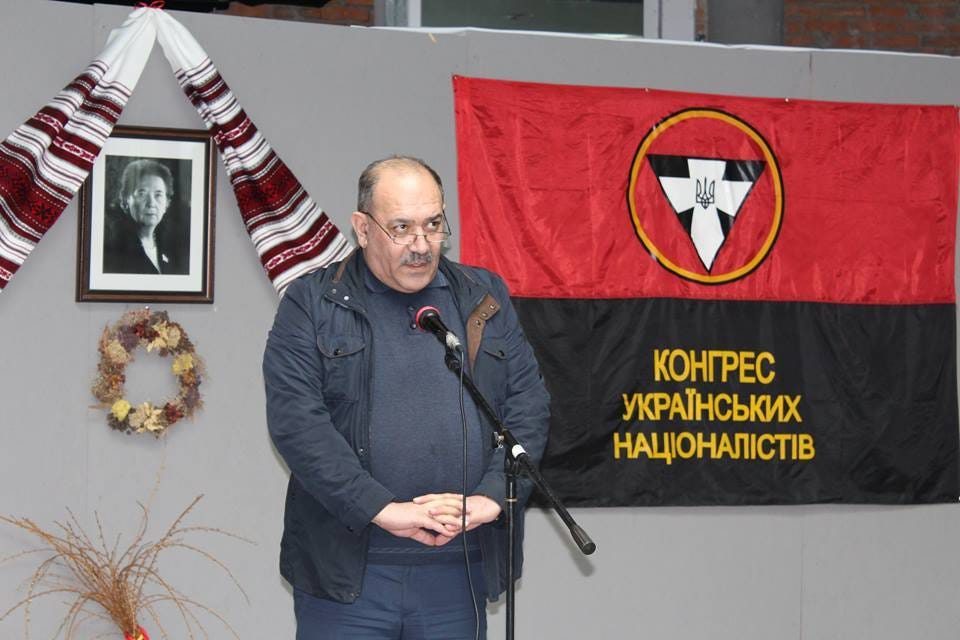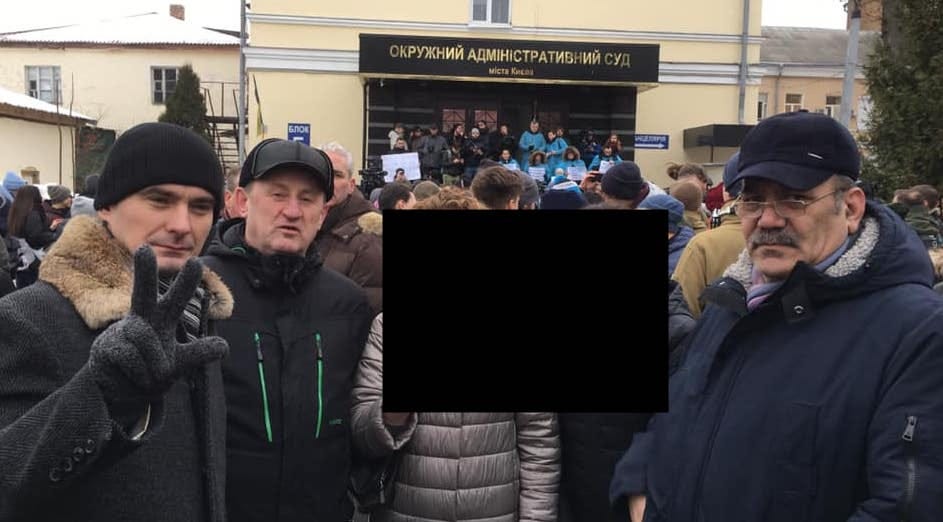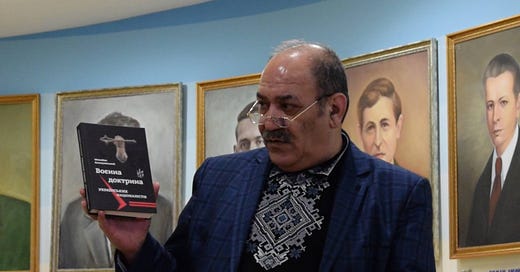The Banderite From Azerbaijan
Ex-advisor to Ukrainian Education Ministry arrested for 1993 murders

A Ukrainian citizen from Azerbaijan was arrested through Interpol last weekend by Polish border guards. Elkhan Nuriyev, who advised OUN-B member Serhiy Kvit as Education Minister of Ukraine (2014-16), now faces extradition to Azerbaijan, where he is accused of murdering several officials in 1993. According to the Institute for Reporters’ Freedom and Safety, an Azerbaijani NGO that has called for his release,
Nuriyev served as head of the Gubadli region from September 1992 to August 22, 1993. In September of the same year, he left Azerbaijan… On August 31, 1993, members of the “Lastochka” reconnaissance group, during the occupation of the Gubadli region by Armenians, killed the prosecutor, the investigator of the prosecutor’s office, the head of the regional police and his driver, the chairman of the court and a police officer.
In 1995, nine members of the “Lastochka” detachment were sentenced to death, but due to the abolition of the death penalty, the death penalty was replaced by life imprisonment. During the trial, the defendants stated that the killings were due to the fact that officials tried to flee the area instead of organizing its defense.
A criminal case was initiated against Nureyev back in 1993 under the following Articles of the Criminal Code: the Article 120.2.10 (repeated premeditated murder), 29, 120.2.11 (attempted murder for the motives of banditry), 309.2 (exceeding official authority, entailing grave consequences), [according to] the press service of the Prosecutor General’s Office…
According to an Azerbaijani news site, Elkhan Nuriyev is “suspected as an organizer” of the political murders. Apparently another reports that he is accused of having led the aforementioned “reconnaissance group.” Its Wikipedia page doesn’t mention Nuriyev, but calls it an “intelligence-sabotage group,” and has a section naming the dead and imprisoned “gang members.”
By 1995, the year that his alleged co-conspirators were sentenced, Nuriyev became an advisor to OUN-B leader Slava Stetsko in Ukraine, and joined her Anti-Bolshevik Bloc of Nations (ABN), several years after journalists Scott and Jon Lee Anderson described it as “the largest and most important umbrella for former Nazi collaborators in the world.”
That description became accurate with the help of Gerhard von Mende, a Nazi official who led the Caucasus division of the Reich Ministry for the Occupied Eastern Territories. For example, his “right-hand man” from Uzbekistan, who represented the pro-Nazi “Turkestan National Fighting Units” to the German General Staff during World War II, cofounded the ABN in 1946 and served on its Central Committee through the 1990s. Before the organization disbanded in 1996, Nuriyev apparently became the head of its Caucasus section, because he kept the title as chairman of the “ABN-Caucasus.”
Elkhan Nuriyev has been instrumental in the OUN-B’s efforts to recreate the ABN for the purpose of promoting the balkanization of Russia as the ultimate goal of Ukrainian nationalists and their allies. In 2014 he founded the Anti-Putin Information Front (aka the “AntiPutin Informational Front of Nations”) with OUN-B member Serhiy Parkhomenko, who appears to be his closest collaborator. Parkhomenko directs a Ukrainian nationalist think tank that counts Nuriyev among its experts.

Nuriyev and Parkhomenko both advised the Banderite Minister of Education and Science of Ukraine, a former captain in a paramilitary organization created by the OUN-B. Serhiy Kvit served as Education Minister from February 2014 through April 2016, and in December of that year, Kvit was one of three representatives of OUN-B to meet with the leadership of the OUN-M faction to discuss their potential reunification. Kvit is now president of the National University of Kyiv-Mohyla Academy, and has appeared on TV to call for Nuriyev’s release.
Serhiy Parkhomenko was born in a town on the northern coast of the Black Sea in Krasnodar Krai, also known as Kuban. This is a region of southern Russia, across the Kerch Strait from Crimea, where less than two percent of the population identifies as Ukrainian. Before founding his think tank, Parkhomenko coordinated a “Kuban With Ukraine” committee dedicated to the goal of “Ukrainizing” the region. His committee even declared a government in exile, apparently with Parkhomenko as its Minister of Information. Parkhomenko has worked as an editor of the OUN-B’s Ukrainian Information Service (UIS), the deputy editor of the OUN-B newspaper, and a press secretary to OUN-B leader Stefan Romaniw.
In the spring of 2014, the Stepan Bandera Center for National Revival (CNR), located in the OUN-B headquarters building in Kyiv, hosted a small conference that launched the Anti-Putin Information Front. The CNR, UIS, and Parkhomenko’s think tank sponsored the meeting. Speakers included the editor of the OUN-B newspaper, the head of the OUN-B’s militant Youth Nationalist Congress, and “a representative of the Azerbaijani diaspora” who raised “the issue of the protection of Ukrainians on the territory of Russia, in particular in the Kuban.”
Serhiy Parkhomenko and Elkhan Nuriyev also spoke, of course. Nuriyev said, “The time may come when we will put aside the Koran and the Bible, and our main book will be the UPA textbook ‘Ukrainian Partisan.’” He was referring to a publication by the 1940s paramilitary arm of the OUN-B that was largely established by Banderites who had infiltrated Nazi auxiliary police units. In 1943-44 the UPA waged a barbaric ethnic cleansing campaign against Poles and Jews in western Ukraine.
In early 2019, Elkhan Nuriyev presented two books at the “Stepan Bandera center for patriotic education of young students,” one of them by the OUN-B newspaper editor. The other was The War Doctrine of Ukrainian Nationalists by Mykhailo Kolodzinsky. According to Bandera biographer Grzegorz Rossolinski-Liebe, Kolodzinsky began to write this “important OUN document” while lecturing at an Ustaša paramilitary camp in 1930s Fascist Italy “sponsored by Mussolini.”
A leading OUN member, Mykhailo Kolodzins’kyi, gave military courses in this camp. He also began work there on ‘The War Doctrine of the Ukrainian Nationalists,’ an important OUN document in which he planned a Ukrainian uprising, propagated the cult of war, and presented a Ukrainian version of imperialism, which was intended to protect ‘our own race’ and to extend the Ukrainian territories. Kolodzins’kyi argued in ‘The War Doctrine’ that during a national uprising, the western Ukrainian territories should be fully ‘cleansed’ of Poles, and also that ‘the more Jews killed during the uprising, the better for the Ukrainian state.’”
According to historian Marek Wojnar,
Without a doubt, the superpower concept best-known among OUN activists was created by Mykhailo Kolodzinsky. He presented his vision in The War Doctrine of Ukrainian Nationalists, completed in 1938… The full version of the work was considered lost until 2013… In it, Kolodzinsky postulated an eastern vector of Ukraine’s expansion. His minimum plan was to base the eastern borders of Ukraine on the Volga and the Caspian Sea (with occupation of the Absheron Peninsula and Baku [i.e. Azerbaijan]). At the same time, the OUN activist postulated shifting the borders of Europe ‘to Altai [in southern Siberia] and Dzungaria [in northern Xinjiang]’, the Ukrainian influence extending to the republics of Turkestan, establishing Kazakhstan as a dominion, and gaining Ukrainian control over the industrial centres of Magnitogorsk [in the Urals] and the Kuznetsk Basin [in southwestern Siberia].
Eight months after the Anti-Putin Information Front (APIF) was established, in December 2014, so was the Alliance of Baltic and Black Sea Nations (ABBN), with Elkhan Nuriyev as one of its signatories. The latter ABN successor project seems to have been initiated by the Congress of Ukrainian Nationalists (KUN), a far-right political party co-founded by Slava Stetsko. Her death in 2003 may have complicated the KUN’s relationship with the Bandera Organization, but for the past decade, the party has been led by someone who appears to be an OUN-B member and friends with Nuriyev.
In April 2016, Nuriyev and Parkhomenko held a press briefing dedicated to the 70th anniversary of the ABN at the Ukraine Crisis Media Center in Kyiv. They were joined by Maria Bazeluk, a member of the KUN leadership and former editor of the OUN-B newspaper, who was active in the ABN. She spoke of “the need to restore ABN, albeit in a different format and under a different name.” As for Elkhan Nuriyev, he said, “Everyone understands that Ukraine is the ‘front end’,” or the vanguard, in the “joint struggle” against “the Russian empire.” Serhiy Parkhomenko talked about progress made with the establishment of the APIF and ABBN, but stressed, “we have to wage war on the territory of the enemy, otherwise it will not be possible to destroy the neo-Bolshevik Russian empire.”

Three years later, reacting to the April 2019 election of Volodymyr Zelensky as President of Ukraine, Serhiy Parkhomenko, “an analyst with the right-wing To Protect Ukraine movement,” told The Daily Beast, “We are going to raise a new Maidan revolution if he makes a single step away from our course… He is weak, he does not have a religion, he does not have a nationality.” The OUN-B organized the Protect Ukraine movement that spring, which launched the far-right “Capitulation Resistance Movement” (Rukh Oporu Kapitulyatsiyi, ROK) against the newly elected president’s peacemaking agenda in October. Parkhomenko became a member of the ROK Coordination Council, led by the deputy head of OUN-B for policy.
Elkhan Nuriyev was involved in the “Resistance Movement” from the beginning. By 2019, he had a role in the OUN-B newspaper. That year, he joined Protect Ukraine, and did several interviews with OUN-B members on his radio show, including Stefan Romaniw of Australia, the international Leader of the Bandera Organization, and Walter Zaryckyj of New York, who oversees the OUN-B network in the United States. Both are former ABN members.
Zaryckyj is the executive director of the Center for US-Ukrainian Relations which organizes annual conferences in Washington, and the president of the Ukrainian American Freedom Foundation, the financial arm of OUN-B in the US that owns 40% of the OUN-B headquarters building in Ukraine. He has accused me of bugging the US headquarters building of OUN-B and listening to their meetings.

In October, after the launch of the “Capitulation Resistance Movement,” Nuriyev interviewed Serhiy Repik, another OUN-B member on the ROK Coordination Council, and a leader of the MNK, or “Bandera Youth.” In 2016, Repik and some MNK friends met with Sébastien de Boëldieu, the “foreign minister” of the Italian neo-Fascist CasaPound movement. One of those friends later joined a more extreme Ukrainian organization, Tradition and Order. According to Repik, “We talked about the basic principles of [the] CasaPound movement, specifics of struggle in Italy, about the effect of Putin’s propaganda on the European nationalists and how to counteract it. We hope for new meetings! #MHK, #CasaPound.” By 2018, Repik and other MNK members began to work with C14, a violent neo-Nazi organization in Ukraine.
Ulana Suprun, the former acting Healthcare Minister of Ukraine (2016-19), and an OUN-B member from Michigan, joined the “Resistance Movement” after her dismissal from Zelensky’s government. Suprun and her OUN-B husband from Canada have palled around with prominent neo-Nazis from Ukraine, including C14. In January 2020, she saw Elkhan Nuriyev on her birthday, as well as Serhiy Parkhomenko and OUN-B leader Stefan Romaniw. A year later, Nuriyev spoke at the MNK congress at which Serhiy Repik became its leader. Nuriyev also changed his Facebook profile picture to commemorate the 20th anniversary of this OUN-B “facade structure.” The MNK’s symbol is the Dontsovian beast, named for the grandfather of Ukrainian fascism who translated Mein Kampf and compared its author to Jesus.
Serhiy Parkhomenko appears to have first raised the alarm about Elkhan Nuriyev’s arrest on October 2, 2022. This triggered an antisemitic Facebook post “To the Poles” from Ivan Suta, an elder member of Right Sector and cofounder of Tryzub, the 1990s paramilitary wing of the OUN-B and KUN that spearheaded the notorious Pravy Sektor in 2013. “Poland is run by you — Poles, and not by the descendants of those who crucified Christ — as we have in Ukraine,” wrote Suta. “Do everything possible to ensure that Elkhan Nuriyev returns to his second homeland.” Nuriyev’s allies are all but certain that his potential extradition to Azerbaijan is the work of the Kremlin, but some are confident that he will be released.
A week later at the Warsaw Human Dimension Conference, a representative of the Azerbaijani Institute for Reporters’ Freedom and Safety called on Polish authorities to free Elkhan Nuriyev, and denounced the “egregious political persecution of one of the brightest critical voices of Azerbaijan.” They said that Nuriyev became a Ukrainian citizen in 2009, and has continuously worked in Ukraine as a human rights defender. Furthermore, they claimed, “It was precisely because of his active anti-Putin position, at the request of the Kremlin, that law enforcement agents of Azerbaijan put dissident Elkhan Nuriyev on the wanted list through Interpol.” In any case, Azerbaijan is said to be urgently seeking his extradition.




